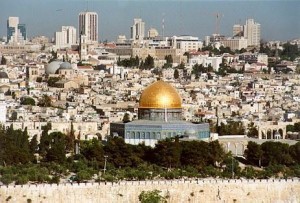 “For Christ, our Passover lamb, has been sacrificed.” – 1 Corinthians 5:7
“For Christ, our Passover lamb, has been sacrificed.” – 1 Corinthians 5:7
“Paul, a servant of Christ Jesus, called to be an apostle, set apart for the gospel of God, which he promised beforehand through his prophets in the holy Scriptures, concerning his Son, who was descended from David according to the flesh and was declared to be the Son of God in power according to the Spirit of holiness by his resurrection from the dead, Jesus Christ our Lord…” – Romans 1:1-4
When I first discovered that many of the Biblical sites in the ancient holy land were now Christian Churches (of different persuasions and denominations) I immediately felt saddened. I guess I expected to see the hillside where Jesus delivered His “Sermon on the Mount” kept in its original condition; I wanted to see the birthplace of Christ, and be on the lookout for sheep, shepherds, donkeys and farmyard animals. But as anyone who has been to Israel knows, such is not the case. Christians through the centuries, after making careful inquiry as to the exact locations, have claimed many of these sites for their own by building grandiose Church structures right on top of them.
While my initial reaction was one of deep disappointment, I now find comfort in the fact that the alternative would be far more grevious. Israel is a real place; a real country, with new buildings being built all the time, with roads, traffic lights, shops, offices, police stations, restaurants, schools and universities. Imagine going to the “holy land” and finding that the Mount of Transfiguration was now a parking lot, or worse, a soccer stadium. Imagine that the traditional site of Christ’s birthplace was now a gas station. Would that not be a far more disappointing reality? As bad as it is that many of these places are now known for the peddling of religious relics, it is better this, than around two millennia on, they were now simply places where hamburgers and hot dogs were sold or a water slide park for children. It is far better scenario that many of these ancient sites have been claimed by Christians and developed into Churches where people can pause and reflect on the fact that something sacred took place there, centuries before – God really did something special in real time and real space.
The fact is, Christianity is based on historical reality. The Lord Jesus Christ, as touching His humanity, was born in a real place called Bethlehem; He lived a sinless life in the middle East, growing up in Nazareth (rather than London, Paris, Beijing or Chicago), and the events surrounding Christ’s atoning death for sinners on the cross and His triumphant resurrection really took place in and around the city of Jerusalem in Israel.
As we celebrate holy week with the events of the crucifixion and resurrection fresh in our minds, lets remember the great truth: God’s love for the world is seen by the giving of His Son, so that every one of those who put their trust in Christ, believing in Him, will in no way perish but have eternal life. Christ died for our sins and rose again the third day. Jesus really IS the Savior of the world.
As Romans 1:4 makes clear, God has declared Jesus to be His Son conclusively and with mighty power by raising Him from the dead, and in doing so, vindicates all that He is and claimed to be, all that He said, and all that He did.
He was punished so we could be forgiven; He was wounded, so that we might be healed; He took the very curse our actions deserved so that we might receive the blessing; He was made sin with our sinfulness, that we might be made righteous with His righteousness; He died our death, so that we could share His life. Hallelujah, what a Savior!
As many might already know, the English word “holiday” is a modern day derivation of the old English expression “holy day” – a day set aside for the honor and worship of God. Enjoy these two short videos below and may I wish you and yours, very happy holy days:
The first video is a greeting from Covenant Seminary concerning holy week:
Here is a very thought provoking video (introduced by Todd Bolen) on the significance of the sacrificial lamb in Jewish thought, pointing us to the atonement of Christ.
The Sacrificial Lamb from SourceFlix on Vimeo.
